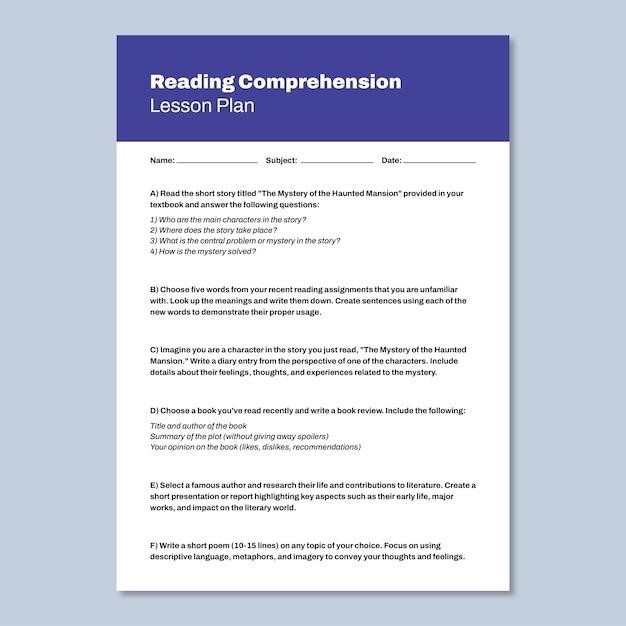Storage Rental Agreement PDF Free⁚ Your Guide to Secure Storage
A storage rental agreement is a legally binding contract between a storage facility owner and an individual looking to rent storage space․ This agreement details the terms and conditions of using a storage unit or locker for storing personal property and belongings․ These agreements protect both parties by clearly outlining rental costs, access rights, responsibilities, and liability․
What is a Storage Rental Agreement?
A storage rental agreement, also known as a storage space lease agreement, is a legally binding contract that establishes the terms and conditions for renting a storage unit․ It’s essentially a rental agreement specifically tailored for the storage of personal property․ This agreement outlines the responsibilities and obligations of both the storage facility owner (landlord) and the individual renting the storage space (tenant)․
The agreement serves as a crucial document for both parties, providing clarity and protection․ It outlines the duration of the lease, the monthly rental rate, any insurance coverage requirements, and any restrictions on the use of the storage space․ The agreement may also include provisions regarding access hours, security measures, and the tenant’s responsibility for the stored items․
A storage rental agreement is a vital component in ensuring a smooth and secure storage experience for both the facility owner and the renter․ It lays out the framework for the rental arrangement, minimizing misunderstandings and potential disputes․
Essential Elements of a Storage Rental Agreement
A comprehensive storage rental agreement should include several key elements to ensure clarity and legal protection for both parties․ These essential elements typically cover the following aspects⁚
- Parties Involved⁚ The agreement should clearly identify the landlord (storage facility owner) and the tenant (individual renting the storage space), including their full legal names and addresses․
- Storage Unit Description⁚ A detailed description of the storage unit is essential․ This includes the unit number, size, and any specific features like climate control or security measures․
- Rental Period⁚ The agreement should specify the duration of the lease, whether it’s a fixed term or month-to-month․ It should also clearly indicate the start and end dates of the rental period․
- Rental Rate⁚ The monthly rental rate should be clearly stated, along with any late payment fees or penalties․
- Payment Schedule⁚ The agreement should outline the payment terms, including the due date for rent payments and the method of payment (e․g․, cash, check, online payment)․
- Insurance Coverage⁚ The agreement should address insurance requirements․ It might specify whether the landlord provides insurance coverage for the tenant’s belongings or if the tenant is responsible for securing their own insurance․
- Access Rights⁚ The agreement should define the tenant’s access rights to the storage unit, including permitted hours and any restrictions․
- Prohibited Items⁚ The agreement should outline items that are not permitted to be stored in the unit․ This might include flammable materials, hazardous waste, or other items that pose safety risks․
- Termination Clause⁚ The agreement should include a clear termination clause that outlines the process for ending the lease, including notice periods and any potential penalties․
- Liability⁚ The agreement should address liability in case of damage to the storage unit or the tenant’s property․ It might specify the landlord’s liability for damage caused by negligence or other factors․
- Dispute Resolution⁚ The agreement should include a method for resolving any disputes that may arise between the landlord and tenant․
It’s important to note that specific legal requirements for storage rental agreements can vary by state or region; Consulting with a legal professional to ensure compliance with local laws is always recommended․
Downloading Free Storage Rental Agreement Templates
Finding free storage rental agreement templates online can significantly simplify the process of creating a legally sound agreement․ Numerous websites offer downloadable templates in various formats, such as PDF and Word documents, allowing you to customize them to suit your specific needs․ These templates provide a solid framework for outlining essential elements and clauses, saving you time and effort in drafting a contract from scratch․
When searching for free storage rental agreement templates, look for reputable websites that specialize in legal documents or offer templates specifically designed for storage rentals․ Ensure the templates are updated and compliant with current legal regulations․ Carefully review the terms and conditions provided in the template to understand its scope and limitations․
Remember, free templates should be considered a starting point; While they provide a valuable foundation, it’s crucial to review and customize the document to reflect your specific situation and requirements․ If you’re unsure about any legal aspects, seek professional legal advice to ensure the agreement is legally binding and protects your interests․
Benefits of Using a Storage Rental Agreement

Implementing a storage rental agreement offers several benefits for both the storage facility owner and the renter․ For the facility owner, a well-structured agreement provides clarity regarding the terms of the rental, ensuring consistent procedures and expectations for all tenants․ It establishes clear guidelines for payment, access, liability, and termination, minimizing potential disputes and misunderstandings․
Renters also benefit greatly from a comprehensive storage rental agreement․ It outlines their rights and responsibilities, ensuring they understand the terms of the lease, including rental fees, insurance requirements, and access restrictions․ The agreement serves as a legally binding document that protects both parties from potential legal issues and clarifies the responsibilities of each party in case of unforeseen circumstances or disagreements․
Furthermore, a storage rental agreement fosters transparency and trust between the renter and the storage facility owner․ It provides a clear framework for managing the rental process, ensuring a smoother and more secure experience for both parties involved․
Types of Storage Rental Agreements
Storage rental agreements can be categorized into different types depending on the specific needs and circumstances of the renter and the storage facility․ One common type is the residential storage rental agreement, which is tailored for individuals renting storage space for personal belongings․ This type of agreement typically outlines the rental period, monthly fees, access hours, and any restrictions on the type of items allowed in the unit․
Another type is the commercial storage rental agreement, designed for businesses or organizations renting space for inventory, equipment, or other business-related items․ These agreements often include clauses related to the storage of hazardous materials, insurance requirements, and specific access needs for business operations․
Additionally, some storage facilities offer climate-controlled storage units, which require a specialized agreement outlining the temperature and humidity control conditions․ These agreements may also include provisions regarding the storage of temperature-sensitive items, such as artwork or electronics․
Legality and Enforcement of Storage Rental Agreements
Storage rental agreements are legally binding contracts that create a landlord-tenant relationship between the storage facility owner and the renter․ These agreements are enforceable in courts of law, meaning that if either party breaches the terms of the agreement, the other party can seek legal remedies․
For example, if a renter fails to pay rent or violates the terms of the agreement, the storage facility owner can take legal action to evict the renter or recover unpaid rent․ Similarly, if the storage facility owner fails to provide the agreed-upon storage space or violates the renter’s rights, the renter can file a lawsuit to seek compensation for damages or breach of contract․
It is crucial to ensure that the storage rental agreement is clearly written, legally sound, and signed by both parties․ A well-drafted agreement protects both the storage facility owner and the renter, minimizes the risk of disputes, and provides a clear framework for resolving any issues that may arise․
Key Considerations for Choosing a Storage Facility
Selecting the right storage facility is crucial for safeguarding your belongings․ Here are some key considerations to guide your decision⁚
Location and Accessibility⁚ Choose a facility that is conveniently located and accessible for you․ Consider factors like proximity to your home or business, ease of access, and parking availability․
Security Measures⁚ Security is paramount when storing valuable items․ Look for facilities with robust security features such as surveillance cameras, gated access, on-site security personnel, and alarm systems․
Unit Size and Pricing⁚ Determine the appropriate unit size for your needs and compare prices across different facilities․ Remember to factor in any additional fees like insurance, administration charges, and late payment penalties․
Climate Control⁚ If you are storing temperature-sensitive items, opt for a facility that offers climate-controlled units․ This helps protect your belongings from extreme temperatures and humidity․
Reputation and Reviews⁚ Research the facility’s reputation by reading online reviews and testimonials from previous customers․ This will give you insights into their customer service, reliability, and overall experience․
Storage Rental Agreement Clauses⁚ What to Look For
The storage rental agreement is a vital document outlining the terms and conditions of your storage arrangement․ It’s crucial to carefully review the clauses to ensure your rights and responsibilities are clearly defined․ Here are some key clauses to pay close attention to⁚
Rental Period and Termination⁚ Understand the initial rental period and the process for terminating the agreement․ Consider factors like notice periods, early termination fees, and the landlord’s right to terminate the agreement under specific circumstances․
Rent and Payment⁚ Clarify the monthly rental rate, payment due dates, and any late payment penalties․ Ensure the agreement specifies the payment method and whether there are any discounts for early payment or long-term rentals․
Access and Hours of Operation⁚ Check the facility’s access hours and the procedures for accessing your storage unit․ This includes any restrictions on access times, the need for prior appointments, and the use of security codes or keys․
Insurance and Liability⁚ Determine the facility’s insurance coverage and your liability for damage or loss to your stored property․ Consider whether you need additional insurance coverage for valuable items, and clarify the facility’s responsibility for any losses due to negligence or unforeseen events․
Prohibited Items⁚ Be aware of any items prohibited from storage at the facility․ Commonly prohibited items include hazardous materials, flammable liquids, perishable goods, and firearms; This information is crucial to ensure compliance and prevent potential penalties․
Storage Rental Agreement⁚ Sample Clauses
Understanding the key clauses in a storage rental agreement is essential for both landlords and tenants․ Here are some sample clauses that illustrate common elements found in such agreements⁚
Rental Period and Termination⁚
“The rental period for the storage unit shall be for a term of [Number] months, commencing on [Date] and ending on [Date]․ Either party may terminate this agreement upon [Number] days’ written notice to the other party․ In the event of a breach of this agreement by the tenant, the landlord may terminate this agreement immediately․”
Rent and Payment⁚
“The monthly rental rate for the storage unit shall be [Amount], payable in advance on the [Day] of each month․ Late payment of rent shall incur a late fee of [Amount] for each day the payment is overdue․ The landlord may, at its discretion, disconnect access to the storage unit for non-payment of rent․”
Access and Hours of Operation⁚
“The storage facility shall be accessible to tenants during the following hours⁚ [Days of the week] from [Start time] to [End time]․ Access to the storage unit shall be restricted to the tenant and any authorized representatives, as identified in writing by the tenant to the landlord․ Access may be denied to the tenant for failure to comply with the terms of this agreement․”
Insurance and Liability⁚
“The landlord provides basic insurance coverage for the storage facility, but does not assume responsibility for the loss or damage to the tenant’s property stored within the unit․ The tenant is responsible for securing their own insurance coverage for the stored property․ The landlord shall not be liable for any loss or damage to the tenant’s property caused by any act of negligence․”
Prohibited Items⁚
“The tenant shall not store any hazardous materials, flammable liquids, perishable goods, or any other items prohibited by law or the landlord’s regulations․ Storage of firearms is strictly prohibited within the facility․”
Remember that these are just sample clauses and may not be suitable for all situations․ It is always advisable to consult with an attorney to tailor the agreement to your specific circumstances․
Where to Find Free Storage Rental Agreement Templates
Finding a free storage rental agreement template can be a quick and convenient way to get started with drafting your contract․ Several online resources offer downloadable templates that can be customized to meet your specific needs․ Here are some reputable sources to explore⁚
Legal Templates⁚ This website provides a wide range of legal documents, including storage rental agreement templates․ They offer both basic and more comprehensive templates, allowing you to choose the one that best suits your requirements․ You can download the template in PDF or Word format for easy editing․
Template․net⁚ Template․net offers a collection of free storage agreement templates that cover various aspects of the rental process, including basic contracts, warehouse leases, and self-storage reminders․ Their templates are fully printable and customizable, making them suitable for both personal and business use․
Jotform⁚ Jotform provides a free storage rental agreement template that can be easily customized to fit your needs․ This online platform allows you to create, edit, and share documents electronically, making it a convenient option for signing agreements digitally․ You can also collect e-signatures directly through Jotform, streamlining the entire process․
Papersign⁚ Papersign offers a free storage rental agreement template that simplifies the rental process by outlining rental rates, conditions, and security measures․ This template is adaptable for various items and storage needs, making it a versatile option for both individuals and businesses․
EzLandlordForms⁚ EzLandlordForms provides a comprehensive garage/storage lease agreement template that defines the terms of your garage or storage space rental․ This template is a valuable resource for landlords who need to ensure clear and legally sound contracts for their rental properties․
Remember that these templates are just starting points․ Always review and modify them to ensure they accurately reflect the specific terms and conditions of your storage rental agreement․
How to Use a Storage Rental Agreement Template
Using a storage rental agreement template can save you time and effort while ensuring that your contract is comprehensive and legally sound․ Here’s a step-by-step guide on how to effectively use a template⁚
Choose the Right Template⁚ Select a template that aligns with your specific needs, whether it’s for personal storage, business storage, or a specific type of storage unit․ Ensure that the template covers the essential elements of a storage rental agreement, such as rental terms, payment details, access rights, liability, and termination clauses․
Customize the Template⁚ Once you’ve chosen your template, customize it to reflect the unique details of your agreement․ This may include updating the parties’ names and contact information, specifying the storage unit’s location and size, setting the rental period, and outlining any specific rules or restrictions․
Review and Edit⁚ Thoroughly review the customized template before finalizing it․ Ensure that the language is clear, concise, and easy to understand․ Pay attention to any legal terms or clauses that may need clarification or modification․ If necessary, seek professional legal advice to ensure your agreement is legally binding and protects your interests․
Print and Sign⁚ Print out multiple copies of the finalized agreement․ Both parties should sign and date each copy to indicate their agreement to the terms․ Retain a copy for your records․
Secure Storage⁚ Keep the signed agreement in a safe and accessible place for future reference․ This document serves as a crucial record of your agreement and can be invaluable in case of any disputes or misunderstandings․
Remember that using a template is a starting point․ It’s crucial to personalize it to ensure it meets your specific needs and protects your rights․



Leave a Reply
You must be logged in to post a comment.